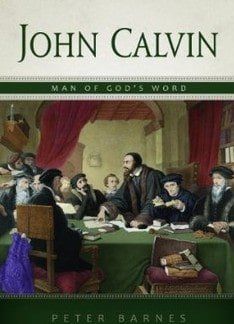John Calvin’s importance is cannot be overestimated. If one were to list the world’s one hundred most influential men in the last five hundred years, Calvin’s name would surely rank high on that list. So when a book appears on Calvin by a well respected author and publisher, we do well to sit up and take notice.
The book consists primarily of two essays. The first considers Calvin’s belief in God’s written Word, while the second (at more than twice the length) discusses Calvin himself as a preacher of God’s Word. Throughout his work, Peter Barnes interacts with a wide range of scholarly opinion, frequently refuting the scholars in his able defence of Calvin’s evangelical orthodoxy.
The themes covered under the first heading, ‘John Calvin and God’s Word, Written’, throw up no great surprises. Peter Barnes is at pains to demonstrate Calvin’s commitment to the sufficiency and authority of Scripture – especially his belief in its ‘complete verbal inspiration and inerrancy’.
The reader’s attention is especially drawn to Calvin’s belief in the ‘humanity of Scripture’, a term with which theologians will be more familiar than ordinary Bible students. Some readers (myself included) will have difficulty accepting that there were faults in the apostle Paul’s literary style – e.g. ‘Paul’s sentence here is defective’ (Calvin: cited on p.11) – whilst fully acknowledging with Calvin that ‘God’s inspiration of his prophets and apostles did not obliterate their humanity’ (Barnes: p.12).
Barnes also notes that Calvin’s doctrine of Scripture includes the necessity of the Holy Spirit for the teaching of the Word to become efficacious, and ‘more than all this, it points us to the Son of God…’ (p.36).
The section divisions in the first essay can be misleading as they tend to detract from the continuity of Peter Barnes’ essay. For example, the second and fifth sections have headings that refer to the ‘authority of Scripture’, whereas the latter section is simply a continuation of the discussion on Calvin’s belief in both the full humanity and the full divinity of Holy Scripture. Similarly, there is what appears at first glance an entirely unrelated section entitled ‘The Fallibility of the Preacher’: it is in fact simply a development of Calvin’s view of the humanity of Scripture and how it affects the matter of interpretation.
The second essay looks at Calvin himself as a preacher of God’s Word (while noting that he is better known as a theologian and commentator). Calvin’s output as a preacher was phenomenal and certainly deserves consideration. Peter Barnes draws from the available historical data to present Calvin the preacher, discussing subjects familiar to all serious preachers: his method, his authority, his character, his pastoral sensitivity and firmness, the centrality of Christ in his preaching, the style of language he employs (vivid use of imagery, etc.), and his application of the truth to the hearts and minds of his hearers.
In his portrait of Calvin the preacher, one wonders at times whether our author is reading too much into the known facts. For example, the suggestion that “’alvin often preached with inadequate preparation’ and that he therefore ‘would make the occasional blunder’ (p.56) is followed by some less than convincing examples of such blunders. For instance, ‘In preaching on Ephesians 6:5-9 he gave a cross-reference to 1 Corinthians 5 when he presumably meant 1 Corinthians 6’ (pp 56-7) – one cannot help wondering, with this distance of time, whether it was not rather an error on the part of Calvin’s stenographers or subsequent copyists! But notwithstanding, Peter Barnes’ work is evidently well researched and his conclusions generally convincing.
Included at the end of the book are two useful appendices. The first illustrates Calvin’s love for the Word of God with extracts from him on Psalm 119 and the second is a translation of Calvin’s Preface to the Geneva Bible of 1546 in which he states his high estimation of Scripture and its supreme usefulness to all who would be taught by God.
Paul Barnes (no relation!)
Basildon







